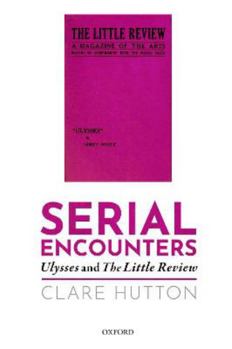Serial Encounters: Ulysses and the Little Review
Select Format
Select Condition 
Book Overview
James Joyce's Ulysses was first published in New York in the Little Review between 1918 and 1920. What kind of reception did it have and how does the serial version of the text differ from the version most readers know, the iconic volume edition published in Paris in 1922 by Shakespeare and Company? Joyce prepared much of Ulysses for serial publication while resident in Zurich between 1915 and 1919. This original study, based on sustained archival research, goes behind the scenes in Zurich and New York in order to recover long forgotten facts that are pertinent to the writing, reception, and interpretation of Ulysses. The Little Review serialization of Ulysses proved controversial from the outset and was ultimately stopped before Joyce had completed the work. The New York Society for the Suppression of Vice had taken successful legal action against the journal's editors, on the grounds that the final instalment of the thirteenth chapter of Ulysses was obscene. This triumph of the social purity movement had far reaching repercussions for Joyce's subsequent publishing history, and for his ongoing efforts with the composition of Ulysses. After chapters of contextual literary history (on the cultural world of the Little Review; the early production history of Ulysses; and the New York trial of 1921), the study moves to a consideration of the textual significance of the serialization. It breaks new ground in Joycean scholarship by paying critical attention to Ulysses as a serial text. The study concludes by examining the myriad ways in which Joyce revised and augmented Ulysses while resident in Paris; it shows how Joyce made Ulysses more sexually suggestive and overt, in explicit response to the work's legal reception in New York.
Format:Paperback
Language:English
ISBN:0192864629
ISBN13:9780192864628
Release Date:May 2022
Publisher:Oxford University Press
Length:280 Pages
Weight:1.00 lbs.
Dimensions:0.7" x 5.9" x 8.9"
Customer Reviews
0 rating





